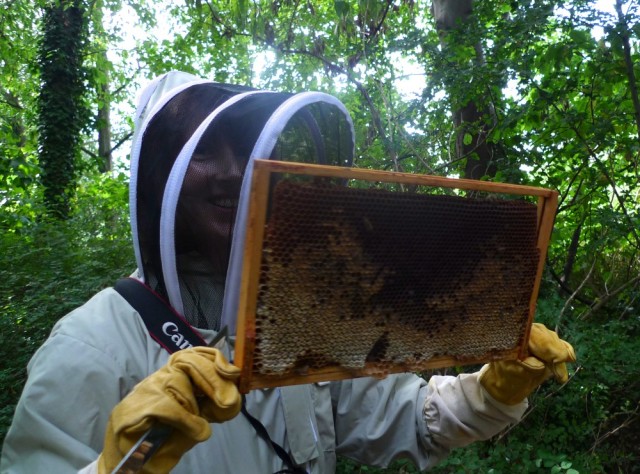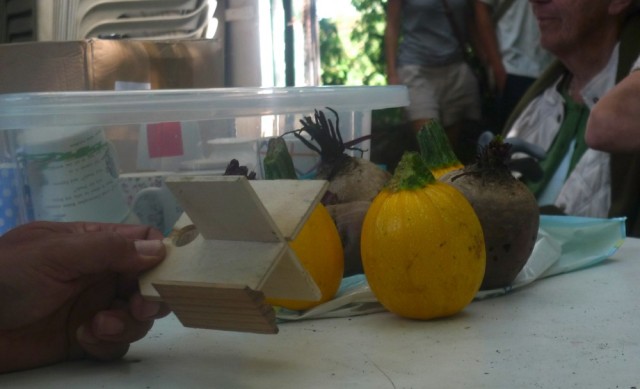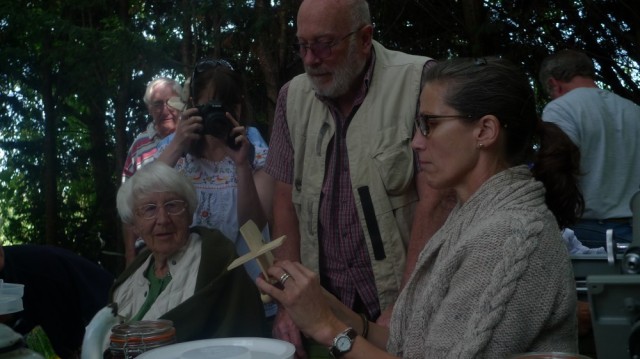Lots going on down at the apiary this weekend. Mysterious objects to identify, tea to drink, cake to eat, gossip to catch up on…
What, for instance, is this?
John Chapple brought this object back from his travels abroad. He said the old beekeeper who gave it to John was disgusted that he didn’t know what it was (I suspect the old beekeeper didn’t know either!). There is a prize of a jar of marmalade for anyone who can identify it for John. The piece of wood which slots in next to the round hole is removable. Emma has a close-up pic of it here: http://twitpic.com/auwyfw.
Perhaps queen rearing equipment – could a queen cell hang from the hole? Mouse guard? Bee gym? Practical joke? No-one knows!
It was a nice day for inspecting, below is Emma holding a frame. We have finished the Apiguard treatment now, so we removed the trays and checked the monitoring board for fallen mites. I could only see about five, which does seem suspiciously low, but then this colony has had several breaks in brood this year, what with a swarm occurring and queen troubles. A break in egg laying and brood production gives varroa less opportunities to reproduce, so between that, the oxalic acid and Apiguard, we should be okay.

The nights are drawing in more quickly. Soon it will be too cold to inspect, and it will be time to put the bees away for winter. No more holding up brood frames, just peeking in the top occasionally to top up feed and in December to do the oxalic acid treatment. Several months of waiting before the joy of the first spring inspections.
But for now we still have sunshine and warmth. I found this bee in the walled rose garden at Walpole Park, Ealing. I adore the smell of roses and find it very frustrating that as soon as I remove my nose from a rose the scent is lost to me, merely a gorgeous memory. I envy this bee for being able to spend time crawling inside its petals, enveloped by the intoxicating aroma.
In another part of the park I had an encounter with this White-tailed bumblebee (Bombus lucorum). We found her crawling on a concrete path, moving about slowly. One of her legs seemed to be missing. I thought that even if she was literally on her last legs, being stepped on would be an unfitting end for this magnificent creature. I attempted to pick her up with a leaf, but she had other ideas and crawled on my hand.
She felt soft and warm. I have read that bumblebees can inflict quite a nasty sting, but she did not seem at all likely to sting me. I carried her around the park trying to find somewhere suitable to leave her, and eventually chose this bush of blue flowers (kindly identified by Christina in the comments below as Caryopteris), which was being enthusiastically bombarded by common carder bees. To my surprise she perked up at once and crawled off my hand to begin feeding. Even with only five legs she seemed to hang on to the flowers and hopefully regained some energy!
A couple of lovely blog posts I’ve come across this week:
Bees of Slovenia – amazing photos of Slovenian hives, which are elaborately decorated with religious and cultural iconography, I love the naughty devils trying to steal honey from the villagers!
“In the Slovene language there is a verb to signify the death of a human. This word is shared only with bees. For all other creatures there is a separate word. Here in a little country in the Balkans, the life of a bee is respected just as the life of a human.”
What’s going on behind that capped cell? – wonderful and quite eerie photos of a developing larvae, she has perfectly formed antennae and legs but is still a translucent white colour.





(Upside-down) Lectern for reading bee-keeping manuals in the field. Hole is where the gadget goes to prevent pages blowing in windy conditions.
LikeLike
That is the best guess we’ve had so far! If you’re proven to be right we’ll arrange a jar of marmalade for you 🙂
LikeLike
November to March – bee-less months! What shall we do?
LikeLike
Read about bees, dream about bees, eat honey…. or alternatively pursue non-bee related interests! Perhaps I’ll go and hang out with the Wetland centre otters.
LikeLike
Read about bees, bee exams and drawing bees is on my list. Or I’ll join you, the otters and other mammals!
There is still 10am gardening on Sunday…
LikeLike
Very true, there is always the 10am gardening…
LikeLike
Let’s not talk about winter yet!!!
LikeLike
You’re right, it’s not here yet!
LikeLike
I always wondered what bee keeps did in winter. Write about bees?
LikeLike
Yes, there will still be plenty of thinking and writing about bees!
LikeLike
I reckon the mystery object is a home-made landing board for use with a nucleus – how wide is it 4/5 frames? Reckon the hole is for carrying/hanging in storage and it was made to sit on the stand in front of a nuc fitted with a rotational entrance (single/multiple/closed on a disc)…. but then I could be very wrong ….
LikeLike
Interesting theory and very imaginative, I like it!
LikeLike
Not sure on the mystery object, though my first thought was to wonder if it went to a non-traditional style of hive. I can’t see where it would work with a top bar, but there are many other styles out there that I’m not that familiar with.
And I agree on winter…. Not yet. Please no. We’ve had such a perfect year here for beekeeping (at least for my bees). This morning, I was standing out in front of the hives and there wasn’t a bee around (too cold still). Every now and then one would poke her head out as if to test the air, but she’d quickly go back inside.
Sigh…. I’m not ready for no bees just yet. I typically don’t mind the break–it recharges me for next year–but not yet.
LikeLike
My first thought was is it part of a radial extractor? My second thought was errrr no idea.
As you say, “winter is coming”. I have been combining hives in preparation. Lets hope they all survive!
Take care.
LikeLike
Yes, fingers crossed for all our bees. I am sure yours will do fine, they are looked after very well.
LikeLike
The blue flower is Caryopteris, bees of all kinds love it in my garden. It is late flowering so ideal for those wanting to extend the season for the bees. Christina
LikeLike
Hi Christina, I’m very grateful that you know the bush’s name, as I hadn’t got a clue! I’ve updated my post to let people know that it’s Caryopteris.
LikeLike
Did anyone manage to figure out what the mystery gizmo was?
LikeLike
No! The jar of marmalade remains unclaimed.
LikeLike
Well done saving a bee. I saved one by releasing it from an abandoned spider web it got stuck in during the summer.
LikeLike